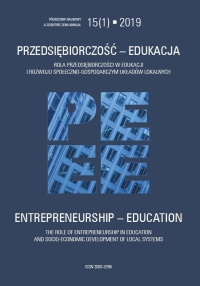Fab Labs in Poland and in the World as an Example of Stimulating Social Entrepreneurship and Creativity
DOI:
https://doi.org/10.24917/3296.151.13Keywords:
city, creativity, entrepreneurship, Fab Lab, manufacturing, MakerSpace, society, technologyAbstract
Fab Labs are various types of laboratories or special spaces that offer access to space, tools, devices and materials for people who want to pursue their ideas, needs and passions. A lot of city residents often have difficult access to tools and machines, and even places. Thanks to the Fab Labs equipment, they can create, repair objects, devices or improve creative skills without the inconvenience and high costs. A typical Fab Lab is equipped with carpentry tools, electric tools, 3D printers, plotters, CNC milling machines, electronics and computers. In these places, classes and workshops are conducted by staff prepared for that. The very important function of these places is sharing knowledge, experiences and common help. Fab Lab is not only a place but an association of DIY enthusiasts, modellers, architects, artists, students and engineers. This article was created in order to explain the idea of these places, it will be done by showing the origin of this activity of social entrepreneurship, by the inventory of existing Fab Lab projects in Poland, by cataloguing the possibilities and their equipment. The specifics of this article are described, as well as the business model is characterised. The article ends with a reflection about the type and degree of fulfilment of the needs of local communities by these initiatives.References
Bungart, S., (2014). Industrial Internet versus Industrie 4.0. Produktion – Technik und Wirtschaft für die deutsche Industrie. Pozyskano z: http://www.produktion.de/automatisierung/industrial-internet- -versus-industrie-4-0/print
Gelber, S.M. (1997). Do-It-Yourself: Constructing, Repairing and Maintaining Domestic Masculinity. American Quarterly, 49(1), 66–112.
Gershenfeld, N.A. (2005). Fab Lab: The Coming Revolution on Your Desktop-from Personal Computers to Personal Fabrication. New York: Basic Books.
Hausner, J., Laurisz, N. (2008). Przedsiębiorstwa społeczne w Polsce. Teoria i praktyka. W: J. Hausner (red.), Czynniki krytyczne tworzenia przedsiębiorstw społecznych. Przedsiębiorstwo społeczne. Konceptualizacja. Kraków: Uniwersytet Ekonomiczny w Krakowie, 13.
Kagermann, H., Wahlster, W., Helbig. J., (2013). Recommendations for implementing the strategic initiative Industrie 4.0: Final report of the Industrie 4.0 Working Group.
Kaźmierczak, T., Przybysz, I., Potkańska, D., Rymsza, M., Schimanek, T. (2011). Przedsiębiorstwa społeczne: Czynniki trwałości, Raport z I fazy monitoringu przedsiębiorstw społecznych. Pozyskano z: https://inspro.org.pl/…/cwps/…/Przedsiebiorstwa_spoleczne_-_czynniki_trwalosci.pdf
Mikhak, B., Lyon, C., Gorton, T., Gershenfeld, N., Mcennis, C., Taylor, J. (2002). Fab Lab: an alternate model of ICT for development. Development by Design, (02), 1–7.
Osunyomi, D., Redlich, T., Buxbaum-Conradi, S., Moritz, M., Wulfsberg, J.P. (2016). Impact of the FabLab Ecosystem in the Sustainable Value Creation Process. OIDA International Journal of Sustainable Development, Ontario International Development Agency, Canada.
Osunyomi, D., (2015). Value Creation: FabLab’s Journey so far. Helmut Schmidt Universitat. Pozyskano z: https://www.greenlab-microfactory.org/publications/
Tokushima, Y. (2016). Creating an Innovative Environment with FabLab – Case study: Bohol, the Philippines. New Breeze Winter, 28(1), 18–20.
Ustawa o przedsiębiorstwie społecznym (2015; 15 września 2018). Pozyskano z: http://www.ekonomiaspoleczna. gov.pl/Projekty,ustawy,o,przedsiebiorstwie,spolecznym,3861.html
Downloads
Published
How to Cite
Issue
Section
License
Articles are published under the terms of the Creative Commons License (CC BY-ND 4.0; Attribution– NoDerivs).

